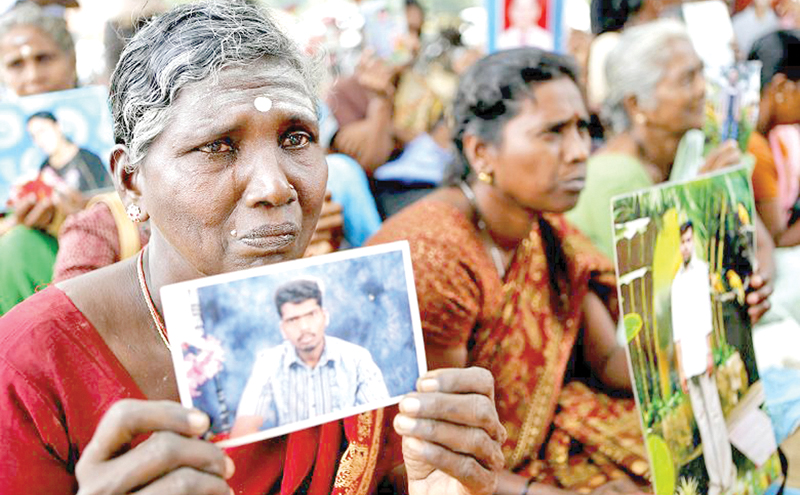Image courtesy of Daily News.
The Human Rights Commission of Sri Lanka’s recommendations to His Excellency the President for implementation based on the HRCSL visit to Northern Province from 16th to 18th February 2023.
1. Long-term detainees are a matter of concern to the Commission, and the government should take meaningful steps to address this issue to build the trust and confidence of the people in the North. It was observed that some prisoners have been in remand prison for 14 years awaiting the conclusion of the trial. It is recommended that steps be taken by the advisory board constituted under the PTA on this matter, as detaining a person for 14 years pending trial is a gross violation of his fundamental rights under the Constitution and a violation of his rights under the International Covenant Civil Political Rights. It is also recommended that the Parole Board take cognizance of the nature of the offence committed and the behaviour of the convicted prisoners and advice the authority to refer for a pardon, or for a nolle prosequi for those awaiting the conclusion of the trial whenever it deems appropriate. The Commission recommends these matters to the Ministry in charge of the prisoners for an appropriate solution. As such has now become relevant and urgent concerning the issue of reconciliation.
2. Despite the participants being in favour of an international mechanism for accountability and reconciliation, they were agreeable to an internal mechanism, provided that the Truth Commission comprises members with competency and integrity, and allows for the participation of the representatives of the victims without any control of the government. The Act of Parliament establishing a Truth and Reconciliation Commission constituted under the powers of Parliament, should be equipped with sufficient powers to function independently and transparently and to address issues placed before them without any political interference.
The Truth Commission must be able to build the trust and confidence of the victims and/or the families of the victims from its inception, or the Government should take steps to do so as a precondition to the establishment of the Commission. To build the trust and confidence of the victims and their families, it is fundamental that issues pertaining to land, enforced disappearances and missing persons and long-term detainees are meaningfully addressed and resolved by the government as a threshold concern.
The Commission observed the conflicting views from the participants about the central purpose of a truth commission. Some of the participants expressed that the overriding
imperative was a need to achieve justice and to bring to account those guilty of gross human rights violations. Some maintained that truth was at least as important as justice and that knowledge of the truth alone would contribute significantly to the cause of peace and stability.
The Commission recommends that to ensure that the truth commission encapsulates these views, it is important to be constituted with members of competency and integrity and with the participation of the representatives of the victims. Its terms of reference must include the power to act independently without any political interference to achieve justice and bring peace and stability. It is vital to ensure that the members of the commission have no connection with any politician and their families. Transparency, independence, competency and integrity are vital components of the truth commission to be a successful internal mechanism of truth-seeking, reconciliation and reparation.
3. Drug trafficking and smuggling is a matter of concern to the whole country. To address this issue it is recommended to the government that border control by the Navy is
strengthened along the coast island-wide. In the event, permanent checkpoints and barriers are necessary for the North for the protection of civilians from habitual offenders and for national security and public order, it is recommended to have a consistent security policy applicable to all provinces in the country dependent on the intelligence data collected by the Security Council and the policy of the government on the national security of the people in Jaffna. The main concern of the commission was to address the disparity between the North and the South on the security issue.
4. In view of what transpired during the discussion in Mannar, severe harassment is caused to the people crossing the checkpoints by the Military by doing body searches on women or directing passengers to alight from the buses and or unload goods from the lorries. The government is advised to instruct the police and army to employ alternative methods of checking at checkpoints with immediate effect until the consistent security policy applicable to all provinces mentioned in point no.3 is established.
5. It was observed that an identification pass system for fishermen in Mannar to fish is a violation of a fundamental right. It is discriminatory as such a system is not in operation in any other part of the country and all fishermen are equal before the law. The Commission intends to discuss this issue with fishermen, their representatives and relevant State authorities island-wide to address this matter and, make a recommendation thereafter.
6. The Commission observed that the livelihood of farmers concerning cultivation and livestock rearing is disrupted, as their lands are primarily in the possession of the military, Wildlife and Forest Department, and Archeological Department. Although the land issues in the North are of great concern to the Commission, at this juncture the Commission made no efforts to discuss or make recommendations about land issues, as Your Excellency has already undertaken to resolve them.
Media Spokesperson
Human Rights Commission of Sri Lanka
27. 02. 2023
